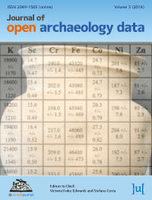
Journal of Open Archaeology Data
Scope & Guideline
Fostering Collaboration in Archaeology Through Transparency.
Introduction
Aims and Scopes
- Open Data Dissemination:
The journal is dedicated to the publication of open datasets from archaeological research, promoting transparency and accessibility in the field. - Interdisciplinary Collaboration:
It emphasizes collaboration across different disciplines, integrating methodologies from archaeology, anthropology, history, and environmental science. - Focus on Technological Innovation:
The journal highlights the use of modern technologies such as GIS, 3D scanning, and machine learning in archaeological research, showcasing innovative approaches to data collection and analysis. - Global Archaeological Perspectives:
It presents datasets from diverse geographical regions and historical contexts, providing a comprehensive view of archaeological practices and findings worldwide. - Critical Data Analysis:
The journal supports the critical evaluation and synthesis of archaeological datasets, encouraging researchers to engage with existing data and contribute to the scholarly discourse.
Trending and Emerging
- Data-Driven Archaeology:
There is a significant trend towards data-driven archaeology, where the emphasis is placed on the collection, analysis, and interpretation of large datasets, reflecting a shift in how archaeological research is conducted. - Interdisciplinary Datasets:
Emerging themes include interdisciplinary datasets that combine archaeological data with environmental, historical, and social data, fostering a more holistic understanding of past human behaviors. - Use of Digital Tools and Technologies:
The integration of digital tools, such as GIS and machine learning, is becoming increasingly common, allowing for innovative analyses of archaeological data and enhancing the depth of research findings. - Sustainability and Heritage Preservation:
There is growing interest in datasets related to sustainability and the preservation of cultural heritage, addressing contemporary issues such as climate change and its impact on archaeological sites. - Global and Regional Comparative Studies:
The journal is seeing an increase in publications that focus on global and regional comparative analyses, which leverage datasets from various geographical contexts to draw broader archaeological conclusions.
Declining or Waning
- Traditional Excavation Reports:
There has been a decrease in the publication of traditional excavation reports, as the field moves towards more data-centric approaches that emphasize datasets rather than narrative descriptions of excavations. - Localized Studies:
Research focusing solely on localized or site-specific studies has waned, as the journal increasingly favors broader datasets that can inform regional or global archaeological narratives. - Historical Artifact Cataloging:
The frequency of papers dedicated exclusively to cataloging historical artifacts has diminished, with a shift towards integrating such data into larger datasets that support comparative analysis. - Non-Quantitative Analysis:
There is a declining interest in non-quantitative approaches to archaeological data, as the journal increasingly emphasizes quantitative data and statistical analysis. - Case Studies with Limited Data:
The trend of publishing case studies with limited datasets has decreased, as the journal encourages comprehensive datasets that provide more substantial contributions to the field.
Similar Journals

Yorkshire Archaeological Journal
Unearthing Yorkshire's Rich HeritageYorkshire Archaeological Journal, published by Routledge Journals, Taylor & Francis Ltd, stands as a pivotal resource in the field of archaeology, particularly focused on the rich heritage and archaeological research within the Yorkshire region of the United Kingdom. With a dedicated ISSN of 0084-4276 and an E-ISSN of 2045-0664, this journal provides both researchers and practitioners valuable insights into archaeological discoveries, methodologies, and theoretical frameworks. While it holds a Q3 ranking in both Archaeology (Arts and Humanities) and Archaeology (Social Sciences), its contributions remain significant for advancing discussions and knowledge within the discipline. The journal's archival depth, converging from as early as 1980 and continuing robustly into 2024, showcases a commitment to fostering academic discourse and exploration of archaeological heritage. Although it does not currently offer open access, its rigorous peer-reviewed articles make it an essential reference for academics, professionals, and students alike who are eager to deepen their understanding of archaeology and its applications.
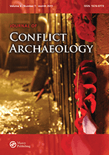
Journal of Conflict Archaeology
Navigating the Complexities of Conflict Through Archaeological PracticeJournal of Conflict Archaeology, published by Routledge Journals, Taylor & Francis Ltd, is a pivotal periodical in the field of archaeology and history, focusing on the intersections between human conflict and archaeological practice. With a robust ISSN of 1574-0773 and E-ISSN 1574-0781, this journal not only presents innovative research findings but also catalyzes critical discussions on how conflicts shape and are shaped by material culture. Spanning volumes since 2005 and continuing through 2024, the journal is ranked in category quartiles, achieving Q3 status in Archeology and Arts & Humanities, and Q2 in History by 2023 metrics, illustrating its significant contribution to academic discourse. The Journal of Conflict Archaeology emphasizes accessibility for scholars and practitioners, making valuable insights available to those navigating the complexities of archaeology in context to historical conflicts. With research that is cited within the 78th and 67th percentiles of its respective fields, this journal serves as an essential resource for researchers, professionals, and students aiming to deepen their understanding of archaeological methodologies in conflict studies.

Annales Instituti Archaeologici
Fostering Scholarly Dialogue in the Archaeological CommunityAnnales Instituti Archaeologici is a distinguished journal published by INST ARHEOLOGIJU, dedicated to advancing research in the field of archaeology. With an ISSN of 1845-4046 and an E-ISSN of 1848-6363, this journal serves as a vital platform for the dissemination of innovative archaeological studies and findings, reflecting the evolving trends and methodologies in this fascinating discipline. Based in Croatia, the journal captures a global audience, emphasized by its Q3 ranking in both Archaeology categories as per the latest 2023 metrics, indicating a solid presence in the academic landscape. Although it does not currently offer Open Access options, its impactful contributions are recognized through its Scopus ranks, where it stands at #137/413 in Archaeology related to Arts and Humanities and #135/354 in Social Sciences. Researchers, professionals, and students interested in the latest archaeological research and its applications will find Annales Instituti Archaeologici to be an invaluable resource, promoting knowledge and fostering scholarly communication within the archaeological community.

Data
Empowering research in Computer Science and Information Systems.Data is an innovative open-access journal published by MDPI, dedicated to advancing research and knowledge in the fields of Computer Science and Information Systems. Since its inception in 2016, Data has positioned itself as a prominent platform for disseminating high-quality research, currently boasting an impact factor reflective of its rigorous peer-review process and academic standards. Situated in Switzerland, the journal encompasses a broad scope of topics, making it an essential resource for researchers, professionals, and students alike. With a notable standing in multiple categories—including Q2 rankings in Information Systems and Information Systems and Management—the journal facilitates access to cutting-edge findings and methodologies that drive innovation in data management and analysis. Scholars are encouraged to utilize this open-access platform to share their findings and contribute to the collective understanding in these rapidly evolving fields.
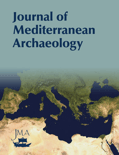
Journal of Mediterranean Archaeology
Connecting Scholars to the Legacy of the MediterraneanThe Journal of Mediterranean Archaeology, published by EQUINOX PUBLISHING LTD in the United Kingdom, is a premier academic journal dedicated to the exploration and dissemination of knowledge within the vibrant field of Mediterranean archaeology. Established in 1988, this journal has consistently demonstrated its commitment to scholarly excellence, attaining a Q1 ranking in various categories, including Archaeology and Arts and Humanities, making it a vital resource for researchers and students alike. With a prominent Scopus rank of #49 out of 413 in Archaeology, it places itself among the top-tier publications, reflecting its impact and relevance in contemporary archaeological discourse. Although the journal is not open access, its rigorous peer-review process ensures the publication of high-quality scholarly articles that contribute significantly to the understanding of the diverse cultural narratives within the Mediterranean region. As the journal moves toward its 35th anniversary, it continues to be a cornerstone for professionals seeking to share groundbreaking research and dialogue in this critically important area of study.

Data in Brief
Empowering Research Through Accessible Data Insights.Data in Brief is an esteemed open-access journal published by Elsevier that has been at the forefront of disseminating valuable and succinct research findings since its inception in 2014. With a focus on multidisciplinary and educational data, the journal serves as a vital platform for researchers, professionals, and students seeking quick access to high-quality data papers that complement larger research articles. Notably, Data in Brief holds a commendable rank of #40 out of 171 in the multidisciplinary category, placing it in the 76th percentile, which underscores its relevance and impact within the academic community. Operating with an open-access model, it ensures that research is readily available to a global audience, facilitating collaboration and innovation across various fields. The journal's commitment to providing a rich repository of easily digestible data makes it an essential resource for anyone interested in enhancing their research or knowledge base.
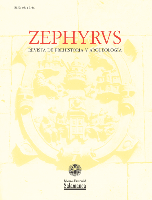
Zephyrus-Revista de Prehistoria y Arqueologia
Exploring the Depths of Human HistoryZephyrus-Revista de Prehistoria y Arqueologia, published by UNIV SALAMANCA, EDICIONES, is a renowned academic journal dedicated to the fields of archaeology and prehistory. Since its inception in 1950, the journal has embraced an Open Access model, facilitating widespread access to cutting-edge research and scholarly discourse while fostering global collaboration among researchers. Based in Salamanca, Spain, this journal has achieved remarkable recognition, evidenced by its Q1 rankings in Archaeology and History as of 2023, and impressive Scopus standings across various categories, including an 83rd percentile in History. The journal's comprehensive scope since 2011 has made it a vital resource for academics seeking to deepen their understanding of human history through archaeological insights. Zephyrus not only provides a platform for disseminating innovative research findings but also serves as a bridge between historical scholarship and contemporary archaeological practices, ensuring that researchers, professionals, and students alike have access to the latest developments in the field.

Publications is a leading international journal published by MDPI, based in Switzerland, that has been at the forefront of scholarly communication since its inception in 2013. As an Open Access journal, it aims to disseminate high-quality research across multiple disciplines, notably in Business and International Management, Communication, Computer Science Applications, Library and Information Sciences, and Media Technology. Its impressive standing is reflected in its 2023 Scopus ranks, with top quartile positions across various fields, including a Q1 ranking in Library and Information Sciences and Media Technology. With a commitment to promoting innovation and collaboration, Publications serves as an essential platform for researchers, professionals, and students alike, allowing them to engage with the latest findings and discourse. The journal's strategic focus on accessibility ensures that knowledge is available to a global audience, fostering an environment conducive to academic and practical advancements. The E-ISSN 2304-6775 identifies its distinct digital presence, making it an invaluable resource for anyone passionate about cutting-edge research.
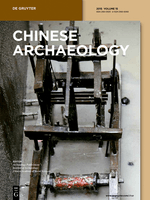
Chinese Archaeology
Charting New Territories in Eastern ArchaeologyChinese Archaeology, published by WALTER DE GRUYTER GMBH, is a leading journal dedicated to the exploration and study of China's rich archaeological heritage. With an ISSN of 2160-5025 and an E-ISSN of 2160-5068, this journal serves as an essential platform for scholars, researchers, and enthusiasts in the field of archaeology, offering a blend of original research articles, reviews, and critical essays that address both contemporary issues and historical narratives. While it currently operates under a conventional access model, making cutting-edge research available to a select audience, it plays a crucial role in advancing knowledge about China's archaeological sites, artifacts, and past civilizations. Given the increasing interest in Eastern archaeology and its significance in a global context, Chinese Archaeology is positioned as a pivotal resource for understanding and interpreting the complexities of China’s historical evolution. Researchers and academics are encouraged to contribute and engage with this vital field of study to foster greater insights and innovations.
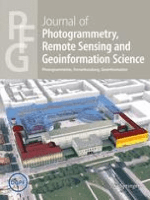
PFG-Journal of Photogrammetry Remote Sensing and Geoinformation Science
Leading the Charge in Earth Observation TechnologiesPFG-Journal of Photogrammetry Remote Sensing and Geoinformation Science, published by Springer International Publishing AG, stands as a prestigious peer-reviewed journal at the intersection of cutting-edge technology and the vital disciplines of Earth and Planetary Sciences, Geography, and Instrumentation. With an impressive impact factor and ranking within the Q1 category, this journal regularly publishes innovative research, methodologies, and case studies that drive advancements in the field. As of its converged years from 2017 to 2024, the journal focuses on the latest trends in photogrammetry, remote sensing, and geoinformation science, providing a crucial platform for researchers, professionals, and students alike. Its open access model ensures that findings are widely accessible, fostering collaboration and knowledge dissemination throughout the global scientific community. Located in Switzerland, geographical and technological diversity is embraced, making the PFG Journal an essential resource for those dedicated to exploring the complexities of our planet and contributing to sustainable development.